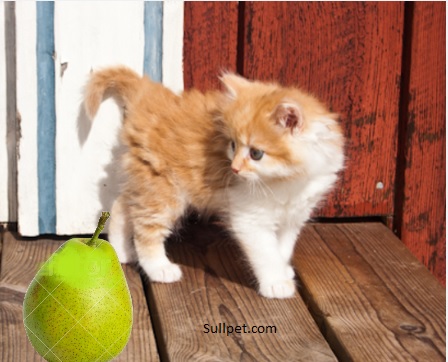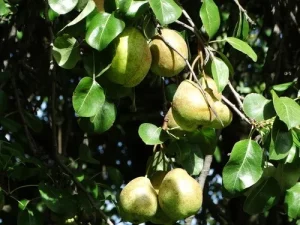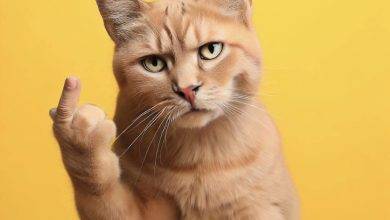Can Cats Eat Pears? Benefits and Risks Explained

Hey there fellow cat lovers! If you’re anything like me, you’re always on the lookout for new ways to treat your furry friend. But when it comes to feeding your cat, it’s important to be cautious and mindful of what foods they can and cannot eat. One fruit that might have caught your eye is pears. So, can cats eat pears? And if so, what are the benefits and risks? In this blog post, we’ll explore the ins and outs of feeding pears to cats and share some helpful tips for safely incorporating them into your cat’s diet. Without wasting any time Let’s dive in!
As a cat owner, you probably already know that cats have a selective diet and prefer to stick to certain foods
Nutritional Value of Pears
Before we dive into whether cats can eat pears, let’s take a look at the nutritional value of pears. Pears are a great source of vitamins and minerals, such as vitamin C, fiber, and potassium. These nutrients help promote good health and a strong immune system in humans. However, do cats benefit from the nutritional value of pears as well? Maybe let’s find out.
Can Cats Eat Pears?
The answer absolutely is yes, cats can eat pears, but it’s very important to be cautious. Because pears might not be toxic to cats, but they contain a huge amount of sugar that can be harmful if being given to your cat in large quantities.
Feeding your cat too much pear can lead to digestive issues, such as diarrhea and vomiting. Additionally, the seeds and skin of pears can be a choking hazard for cats so beware of that.
If you have been reading my article for a while maybe about 2 years, you will definitely know that I don’t advise anyone to give their pet new food or fruit without consulting their vet.
Don’t get me wrong, it’s super important to do your own research and educate yourself about what’s good and bad for your furry friend. However, the truth is that no Google search or AI language model can ever replace the expertise of a qualified vet who knows your pet personally.
Your vet has all the necessary knowledge about your pet’s medical history and dietary needs to give you the best advice about what to feed them.
So, before you decide to add something new to your pet’s diet, make sure to give your vet a call and get their expert opinion. They’ll be able to guide you on portion sizes, risks, and benefits, so you can make sure your pet stays happy and healthy.
Health Benefits of Pears for Cats
The fiber in pears can help regulate digestion and prevent constipation in cats. Additionally, pears contain antioxidants that help protect against cell damage and promote a healthy immune system.
When fed in moderation, pears can provide several health benefits to cats.
As i mentioned earlier, pears are rich in fiber and antioxidants that can help regulate digestion, prevent constipation, and boost the immune system. But you have to do it the proper way.
However, it’s important to note that moderation is key when it comes to feeding pears to your cat or any other animal. While pears are safe for cats to eat, they should not make up a large portion of their diet.
A general guideline to follow is to feed your cat a small amount of pear as a treat or snack once in a while. It’s also essential to remove the seeds and stem from the pear before feeding it to your cat, as they can be harmful to your pet’s digestive system.
Another important factor to keep in mind is your cat’s individual dietary needs and any pre-existing health conditions they may have. Some cats may have sensitivities or allergies to certain fruits or foods, so always consult with your veterinarian before introducing any new foods to your pet’s diet.
They can guide you on how to safely incorporate pears or any other fruits into your cat’s meals in moderation, based on their unique needs.
Risks of Feeding Pears to Cats
Off recent at the time I was preparing this article I had the opportunity to speak with a few cat owners, veterinarians, and nutritionists, and they all agreed that pears can be a great addition to your cat’s diet when fed in moderation. However, it’s important to be aware of the potential risks associated with feeding pears to your feline friend.

Here are some of the risks of feeding pears to cats that you should keep in mind:
Digestive Upset:
Pears contain a lot of fiber, which can be difficult for some cats to digest. This can lead to gastrointestinal upset, such as vomiting or diarrhea.
To prevent digestive upset from feeding your cat pears, start by introducing them in small amounts and gradually increase the portion size over time. You can also try cooking the pears to make them easier to digest. If your cat experiences vomiting or diarrhea after eating pears, discontinue feeding them this fruit.
Choking Hazard
Pears have a round shape, which can be a choking hazard for cats, especially if they are not cut into small pieces.
The easiest way to prevent choking hazards from feeding your cat pears, is always cut the fruit into small, bite-sized pieces before feeding them to your pet.
High Sugar Content
Pears are relatively high in sugar, which can be problematic for cats with diabetes or other health conditions that require a low-sugar diet.
To prevent diabetes, feed your cat pears only as an occasional treat and in moderation. Also, Avoid feeding your cat other high-sugar foods to keep their diet balanced
Allergic Reactions
Just like humans, cats can have allergies to certain foods, including pears. If your cat shows any signs of an allergic reaction, such as itching, swelling, or difficulty breathing, seek veterinary care immediately.
To avoid this, monitor your cat closely after feeding them pears for the first time, and seek veterinary care immediately if you notice any signs of an allergic reaction.
Pesticide Residue
Lastly, pears can sometimes contain pesticide residue, so it’s essential to wash them thoroughly before feeding them to your cat. Consider buying organic produce when possible to reduce the risk of pesticide exposure.
How to Safely Feed Pears to Cats
If you decide to feed your cat pears, it’s important to do so in moderation. A few small pieces of ripe, peeled, and seedless pear can be a healthy treat for your cat.
However, it’s always best to consult with your veterinarian first to ensure that your cat’s dietary needs are being met. Remember to introduce new foods to your cat’s diet gradually to avoid any digestive issues.
Alternatives to Pears for Cats
If you’re looking for other fruits and vegetables that are safe for cats to eat, there are plenty of options. Some of the best fruits and vegetables for cats include blueberries, bananas, pumpkin, and spinach. These foods provide essential vitamins and minerals and are a great way to add variety to your cat’s
diet.
Can cats eat peaches and pears?
As for peaches and pears specifically, both fruits are generally considered safe for cats to eat in moderation. They can provide some nutritional benefits, which I discuss in this article.
What fruit can cats not eat?
here are some fruits that cats should avoid:
- Grapes and Raisins: These fruits can cause kidney failure in cats, and even a small amount can be toxic. Symptoms of grape or raisin toxicity in cats include vomiting, diarrhea, lethargy, and decreased appetite.
- Citrus fruits: Citrus fruits such as oranges, lemons, and limes can cause upset stomach and vomiting in cats due to their high acidity.
- Cherries: Cherries contain cyanide, which is toxic to cats and can cause respiratory failure, seizures, and even death.
- Fruits with pits or seeds: Fruits with pits or seeds, such as peaches, plums, and apricots, can pose a choking hazard or cause intestinal blockages in cats if ingested.
Overall, it’s best to stick to small amounts of safe fruits, such as peaches and pears, and avoid giving your cat any fruits with known toxic properties. If you suspect your cat has ingested a toxic fruit, contact your veterinarian immediately.
What kind of fruits can cats eat?
here are some fruits that can be given to cats in moderation:
- Apples: Apples are safe for cats to eat as long as the seeds and core are removed. Apples are a good source of fiber and can help with digestion.
- Bananas: Bananas are also safe for cats in moderation. They are a good source of vitamins and minerals and can be a tasty treat for your cat.
- Blueberries: Blueberries are high in antioxidants and can be a healthy snack for cats. Just be sure to give them in moderation as too many can cause stomach upset.
- Strawberries: Strawberries are safe for cats to eat as long as they are given in moderation. They are a good source of vitamin C and can be a tasty treat for your cat.
Remember, it’s important to always introduce new foods to your cat’s diet slowly and in moderation to prevent any adverse reactions. Additionally, always remove any seeds or pits from fruits before giving them to your cat, as these can be a choking hazard or cause intestinal blockages.
Conclusion
In conclusion, cats can eat pears, but it’s important to do so in moderation. While pears can provide several health benefits to cats, they can also cause health issues if consumed in large quantities.
Always consult with your veterinarian before adding new foods to your cat’s diet and remember to introduce new foods gradually. With these tips, you can safely incorporate pears and other healthy foods into your cat’s diet.




